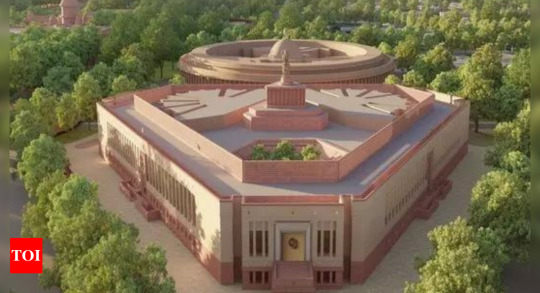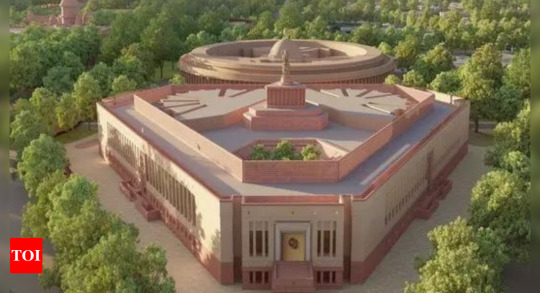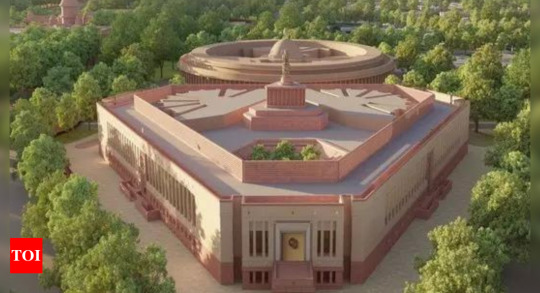#Bharatiya Sakshya Sanhita
Text
Landmark Legislation: Parliament Passes Historic Criminal Law Bills for Overhauling Justice System
Landmark Legislation: Parliament Passes Historic Criminal Law Bills for Overhauling Justice System #CriminalLawReform #ParliamentLegislation #JusticeSystemOverhaul #LegalNews #BharatiyaNyayaSanhita #BharatiyaNagarikSurakshaSanhita #BharatiyaSakshyaSanhita
The Rajya Sabha passed three criminal law bills on Thursday, December 21, 2023, after the Lok Sabha had passed them on Wednesday. The bills are:
Bharatiya Nyaya (Second) Sanhita, which replaces the Indian Penal Code, 1860.
Bharatiya Nagarik Suraksha (Second) Sanhita, which replaces the Code of Criminal Procedure, 1898.
Bharatiya Sakshya (Second) Sanhita, which replaces the Indian Evidence Act,…

View On WordPress
#Bharatiya Nagarik Suraksha Sanhita#Bharatiya Nyaya Sanhita#Bharatiya Sakshya Sanhita#Code of Criminal Procedure#Constitutional Amendments#Criminal Law#Indian Evidence Act#Indian Penal Code#Justice Reform#Legislative Process#Parliament#Sedition#Terrorism
0 notes
Text
New Laws, New Hope.
The new laws – Bharatiya Nyaya Sanhita (BNS), Bharatiya Nagarik Suraksha Sanhita (BNSS) and Bharatiya Sakshya Adhiniyam (BSA), which will replace the Indian Penal Code, Code of Criminal Procedure and the Indian Evidence Act with effect from July 1, 2024.
Criminal laws in India are like the backbone of our legal system. They cover everything from theft to cybercrime, ensuring law and order…
View On WordPress
0 notes
Text
In December 2023, India witnessed significant legal reforms with the enactment of three bills—Bharatiya Nyaya (Second) Sanhita, Bharatiya Nagarik Suraksha (Second) Sanhita, and Bharatiya Sakshya (Second) Bill—replacing the IPC, CrPC, and Evidence Act. These changes address modern challenges, incorporate technology, and spark discussions, particularly around the abolition of the Sedition Law. Public awareness and professional adaptation are crucial during this legal transformation. Explore further details on the Ministry of Law and Justice website, LiveLaw, and Bar and Bench. Visit riseandinspire.co.in for uplifting content.
0 notes
Text
India's Legal Labyrinth: A Satirical Guide to Understanding BNS2, BNSS2, and BSB2
**Once Upon a Time in a Legal Wonderland:**In the grand democratic theatre of India, where laws are often more dramatic than Bollywood blockbusters, we’re witnessing the introduction of three legal musketeers: Bharatiya Nyaya (Second) Sanhita (BNS2), Bharatiya Nagrik Suraksha (Second) Sanhita (BNSS2), and Bharatiya Sakshya (Second) Bill (BSB2). They’re set to replace old legal classics – the IPC,…
View On WordPress
#2023#BNS2#BNSS2#BSB2#civil liberties#civil rights#Code of Criminal Procedure#constitutional law#democratic debate#freedom of speech#India legal reforms#Indian Evidence Act#Indian Parliament#Indian Penal Code#judicial system#Khalistan-movement#legal controversies#legal satire#legal updates 2023#Legal-Analysis#legislative process#National-Security#political humor#sedition law#treason in India#witty commentary
0 notes
Text
"Controversy Unveiled: Opposition MPs Unearth Alarming 'Haste' in Passing Crucial Bills to Replace IPC, CrPC, and Evidence Act. What's Really Behind?"
Opposition members of the parliamentary Standing Committee on home affairs have raised concerns about the speed at which the draft reports on the three criminal justice bills are being adopted. These bills aim to replace the IPC, CrPC, and the Evidence Act. The committee, which is examining the Bharatiya Nyaya Sanhita, Bharatiya Nagarik Suraksha Sanhita, and the Bharatiya Sakshya Bills, has…

View On WordPress
0 notes
Text
"Controversy Unveiled: Opposition MPs Unearth Alarming 'Haste' in Passing Crucial Bills to Replace IPC, CrPC, and Evidence Act. What's Really Behind?"
Opposition members of the parliamentary Standing Committee on home affairs have raised concerns about the speed at which the draft reports on the three criminal justice bills are being adopted. These bills aim to replace the IPC, CrPC, and the Evidence Act. The committee, which is examining the Bharatiya Nyaya Sanhita, Bharatiya Nagarik Suraksha Sanhita, and the Bharatiya Sakshya Bills, has…

View On WordPress
0 notes
Text
"Controversy Unveiled: Opposition MPs Unearth Alarming 'Haste' in Passing Crucial Bills to Replace IPC, CrPC, and Evidence Act. What's Really Behind?"
Opposition members of the parliamentary Standing Committee on home affairs have raised concerns about the speed at which the draft reports on the three criminal justice bills are being adopted. These bills aim to replace the IPC, CrPC, and the Evidence Act. The committee, which is examining the Bharatiya Nyaya Sanhita, Bharatiya Nagarik Suraksha Sanhita, and the Bharatiya Sakshya Bills, has…

View On WordPress
0 notes
Text
Government of India Proposes Three Bills to Substitute the Indian Penal Code, Criminal Procedure Code, and Indian Evidence Act
Context: Union Home Minister introduces the Bhartiya Nyaya Sanhita Bill 2023, the Bharatiya Nagarik Suraksha Sanhita Bill, 2023 and the Bharatiya Sakshya Bill, 2023 in the Lok Sabha.
Proposed Changes
Old Code Proposed Code Altered Provisions Indian Penal Code, 1860Bharatiya Nyaya Sanhita Bill, 2023Bharatiya Nyaya Sanhita will have 356 sections instead of the earlier 511…

View On WordPress
0 notes
Link
On Friday, Union Home Minister Amit Shah tabled three historic bills aimed at replacing the British-era Indian Penal Code (IPC) and the Code of Criminal Procedure (CrPC). Amit Shah, Union Home Minister, addressing the parliamentarians, unveiled the Bharatiya Nyaya Sanhita Bill, the Bharatiya Nagarik Suraksha Sanhita Bill, and the Bharatiya Sakshya Bill. These comprehensive legislative efforts are poised for in-depth scrutiny by a parliamentary panel. He emphasized that the aim of the new bills, "will not be to punish, it will be to provide justice." These reforms entail the introduction of capital punishment for instances of mob lynching and sexual assaults on minors, along with the imposition of a 20-year imprisonment term for gang rape. Union Home Minister Amit Shah presented these visionary bills as a means to replace the archaic British-era Indian Penal Code (IPC), the Code of Criminal Procedure (CrPC), and the Indian Evidence Act. SEDITION LAW CHANGED FROM LIFE IMPRISONMENT TO THREE TO SEVEN YEARS Amit Shah also announced changes in the punishment for sedition. Under the existing law, sedition is punishable by life imprisonment or imprisonment which may extend to three years. Provisions under the new bill proposed to change it to three to seven years imprisonment. DEATH PENALTY FOR MOB LYNCHING Amit Shah announced in Parliament that the government plans to establish a rule for imposing the death penalty in cases of mob lynching. In situations where a group of five or more individuals collaboratively commits murder based on factors such as race, caste, community, sex, birthplace, language, personal beliefs, or other reasons, each member of the group will be subjected to either the death penalty or life imprisonment or a minimum of seven years imprisonment along with the possibility of a fine, according to the new provision. DEATH PENALTY FOR RAPE OF MINOR, 20 YEARS PRISON FOR RAPE The upcoming bills suggest modifications in the penalties for rape. Specifically, the Minister revealed in the Lok Sabha that there will be provisions for imposing the death penalty in cases of rape involving minors. The term 'life imprisonment' has been precisely defined as 'imprisonment for natural life'. According to the new law, individuals found guilty "shall be sentenced to rigorous imprisonment for a duration not less than ten years, extendable to lifelong imprisonment, which denotes incarceration for the remainder of that individual's natural life. Additionally, a fine may also be imposed." The proposed legislation also addresses the penalties for revealing the identity of rape survivors. Amit Shah wants these changes to be about justice more than punishment. Amit Shah wants these changes to be about justice more than punishment. He wants to deal with serious problems like terrorism and violence against women. He believes these new rules will make things better and fairer for everyone. He thinks that it's time to move away from old laws that were more about punishment and bring in new ones that focus on justice and equality. Amit Shah has a plan to make the legal system work better. He wants to increase the number of people who are found guilty to over 90%. For serious crimes that can put people in jail for more than seven years, he wants to have special teams of experts to look into the evidence. This will help make sure that criminals don't get away with their actions. He also wants to make all court processes digital by 2027. This means that people can use computers for legal processes, making things faster and easier. In cases of rape, Amit Shah's plan includes recording statements on video. This way, there is a clear record of what happened and what the victim said. He also wants to speed up investigations and trials. He says that reports about crimes must be ready within three months of the complaint being made, and investigations must be finished within six months for all cases. Verdicts from judges should also be given within a month of charges being framed. Orders and decisions from judges should be available online within a week, making things more transparent and efficient. Amit Shah believes that these changes are in line with what the Prime Minister, Narendra Modi, talked about before. He wants the legal system to be fair and helpful to everyone. By getting rid of old laws and bringing in new ones, India is working towards a fairer and more equal society. By dismantling colonial-era statutes and embracing a contemporary legal framework, it is hoped equal justice will prevail.
0 notes
Text
The Bharatiya Nyaya Sanhita(BNS) Bill, 2023: Brief Overview
This article on 'The Bharatiya Nyaya Sanhita (BNS) Bill, 2023: A Brief Overview' was written by Toya Sen, an intern at Legal Upanishad.
Introduction
On August 11, 2023, the Home Minister of India, Amit Shah, introduced three bills in the esteemed House of Lok Sabha. This is a momentous and pivotal step in India’s existing Criminal Justice System as it aims to revamp and replace the colonial laws, namely the Indian Penal Code, The Code of Criminal Procedure, and The Indian Evidence Act, which have been in place since British Rule.
The Indian Penal Code is set to be replaced by The Bharatiya Nyaya Sanhita, while The Code of Criminal Procedure will be replaced by the Bharatiya Nagarik Suraksha Sanhita. Additionally, the Indian Evidence Act will be substituted with the Bharatiya Sakshya Bill. This article will explore the Bharatiya Nyaya Sanhita (BNS) Bill and its impact on current criminal laws, highlighting the significant changes it has introduced.
Background
In the year 2020, the Ministry of Home Affairs set up a committee led by Dr. Ranbir Singh, who was the former vice-chancellor of the National Law University Delhi (NLUD), to review the three codes of criminal law that govern the criminal justice system in India.
The committee aimed to suggest changes to the criminal laws of the country in a principled, effective, and efficient way that prioritizes the safety and security of individuals, communities, and the nation. They also aimed to uphold constitutional values such as justice, dignity, and the inherent worth of every individual. In February, the committee submitted its recommendations.
The Indian Penal Code (IPC)
As of recently, the Indian Penal Code is the certified code for India, encompassing all areas of criminal law. Its existence can be traced back to the 19th century, when it was first drafted by the First Law Commission, chaired by Thomas Babington Macaulay.
In 1837, the initial version of the code was introduced to the Governor-General in Council, but due to various revisions and amendments, it took more than two decades for the criminal code to be enacted. The drafting was finally completed in 1850 and was presented before the Legislative Council in 1856, but because of the Indian Revolt of 1857, it was further delayed in being added to the statute book of British India.
On January 1st, 1860, the Indian Penal Code was put into effect after undergoing various revisions and amendments made by Barnes Peacock, who later became the first Chief Justice of the Calcutta High Court. The IPC is divided into 23 chapters and has 511 sections in total.
Salient Features of the Bharatiya Nyaya Sanhita (BNS) Bill, 2023
The Bharatiya Nyaya Sanhita Bill, 2023, aims to replace the Indian Penal Code (IPC), which has been in effect since British Rule in India. This new Bill proposes several modifications to the current criminal laws in the country, including those related to sedition, defamation, offenses against women, and attempted suicide. Unlike the IPC, which has 511 Sections, the BNS Bill contains 356 provisions.
According to government officials, this new bill aims at effectively addressing crimes and criminals as well as serving as a deterrent. The legislation has a victim-centric approach, which was lacking in the 160-year-old IPC. The officials have also remarked that the IPC was designed to prioritize British Rule rather than protect human rights. One of the key examples of this would be laws relating to sedition. To address the issue of sedition, which has been used and misused by governments, the bill will seek to erase the sections completely from the new criminal code.
The new law aims to clearly define serious crimes and establish effective methods for dealing with offenders. Priority has been given to crimes such as murder, offenses against women and children, and offenses against the State. To simplify and streamline the law, Section 375 (rape) has been renumbered as Section 63, while Section 300, which defines murder, will now be Section 99.
Definitions that were previously scattered throughout Sections 6 to 52 have been consolidated into one Section. The sections that were overlapping have been combined and made more straightforward, resulting in a total of 356 sections, down from the existing IPC's 511 sections.
Contact Us and avail the best assignment help for students available online!
Key Highlights:
Here are some key points from the bill aimed at tackling problems related to the IPC.
Prevention of crime against women:
This bill directs the government that proper investigation of a case is the top priority of any government. Situations or cases wherein a woman is subjected to the false promise of marriage, gang rape of minors, mob lynching, and chain snatching have been reported, but the previous code did not define the provisions to deal with these crimes. Therefore, in cases of a false promise of marriage, where a woman is being abandoned by her partner after establishing sexual relations, Section 69 of the BNS bill will be able to define this offense.
Also, it has been said that the punishment for the two types of gangrape is to be merged and that the punishment for gangrape of a woman under the age of 18 would be life imprisonment or death.
Mob lynching, Section 101(2):
Due to extensive media coverage of mob lynching cases rising in the country, the new bill has defined the punishment for these instances from seven years imprisonment to life imprisonment or the death penalty.
Child trafficking:
The new BNS Bill proposes that any girl under 21 years of age and any boy under the age of 18 that is being trafficked into India from any other country outside India with the intention to force or seduce them into illicit sexual acts will be punished with imprisonment up to 10 years. Currently, there are no laws that govern or hold a person accountable for the aforementioned acts.
The bill would include a new section that criminalizes the act of hiring, employing, or engaging a minor to commit these acts. Both girls and boys are trafficked to be exploited sexually. The word ‘minor girl’ would be substituted with the word ‘child’ to cover both males and females.
Acts of terrorism:
This section pertains to any actions that aim to jeopardize the unity, integrity, and security of India, intimidate the general public, or disturb public peace and order by utilizing a variety of deadly weapons and other hazardous substances. Additionally, any act listed in the second schedule of the Unlawful Activities (Prevention) Act as a terrorist act is also considered under this section. Anyone involved, either directly or indirectly, in such acts will be considered a terrorist.
Removing sedition from criminal law:
Moreover, if an organization is owned or managed by a person or group involved in terrorism, that organization will be deemed a terrorist entity as well. If a terrorist act results in someone's death, the punishment can include the death penalty or life imprisonment along with a minimum fine of ten lakh rupees. In other cases, the minimum punishment is five years of imprisonment, which can be increased to life imprisonment. The section also prescribes a minimum punishment of five years imprisonment, which can be extended to life imprisonment, for those preparing for a terrorist act.
Removing sedition from criminal law
The existing act of sedition, which is a criminal offense under Section 124A of the IPC, has been set out to be erased from the new bill. Officials, however, have said that any act of secession, armed rebellion, separatist activities, or acts that harm the sovereignty, unity, or integrity of India will be punishable by law under Section 150. The act will be punishable with imprisonment up to seven years or life imprisonment, and it will also be liable for a fine.
Conclusion
In a historic stride towards modernising India's Criminal Justice System, the Bharatiya Nyaya Sanhita (BNS) Bill of 2023 promises to replace outdated colonial-era laws. Crafted with a victim-centric approach, the BNS Bill addresses issues ranging from crimes against women to terrorism. By streamlining and clarifying laws, this legislation is set to enhance the efficiency and effectiveness of the criminal justice process. This significant reform underscores the nation's commitment to safeguarding constitutional values and ensuring a safer, fairer, and more secure society for all.
References:
"Bharatiya Nyaya Sanhita Bill, 2023 – Background, Objectives, Provisions", Vajiram & Ravi: IAS Study Center, 12 August 2023, available at: https://vajiramias.com/article/bharatiya-nyaya-sanhita-bill-2023-background-objectives-provisions/64d731cc6c1bdb05a3de5ab0/
"Explained: Key provisions of Bharatiya Nyaya Sanhita bill 2023, expected to replace Indian Penal Code", CNBC TV 18, 11 August 2023, available at: https://www.cnbctv18.com/politics/explained-key-provisions-of-bharatiya-nyaya-sanhita-bill-2023-expected-to-replace-indian-penal-code-17507431.htm
Read the full article
0 notes
Link
[ad_1] NEW DELHI: On Friday, Union home minister Amit Shah introduced three bills in the Lok Sabha as substitutes for the Indian Penal Code, the Code of Criminal Procedure, and the Indian Evidence Act—laws that originated during the British colonial era.Amit Shah said provision of sedition offences will be completely repealed in the new bill replacing the IPC. I can assure the House that these bills will transform our criminal justice system, the home minister said.The Bharatiya Nyaya Sanhita, 2023; the Bharatiya Nagarik Suraksha Sanhita, 2023; and the Bharatiya Sakshya Bill, 2023 will be referred to a parliamentary panel for thorough examination, Shah confirmed.Shah said, "The laws that are slated for replacement... their original intent was to safeguard and bolster the British administration, with the primary focus being punishment rather than the delivery of justice. Through their substitution, the newly introduced trio of laws aims to prioritize the protection of rights for the citizens of India.""From 1860 to 2023, the country's criminal justice system functioned as per the laws made by the British. With these three laws there will be a major change in the criminal justice system in the country," he said."Under this Bill, we have set the goal that the conviction ratio has to be taken above 90 per cent. That is why, we have brought an important provision that the Sections which provide for 7 years or a greater jail term, under all those cases forensic team's visit to the crime scene will be made compulsory," Amit Shah said."The intention will shift from punishment to the provision of justice. Punishment will be administered to foster a sense of deterrence against criminal activities, " the home minister added.(With inputs from agencies)!(function(f, b, e, v, n, t, s) )( window, document, 'script', ); [ad_2]
0 notes
Text
"Breaking News: Parliament Unveils Groundbreaking Criminal Law Reforms - Discover Radical Transformations Awaiting Our Legal System!"
A parliamentary panel convened in New Delhi on August 24th to analyze bills that aim to replace the Indian Penal Code (IPC), Criminal Procedure Code (CrPC), and the Evidence Act. Union Home Secretary Ajay Kumar Bhalla is expected to deliver a presentation on the three bills – the Bharatiya Nyaya Sanhita, Bharatiya Nagarik Suraksha Sanhita, and the Bharatiya Sakshya Bill – to the committee…

View On WordPress
0 notes
Text
"Breaking News: Parliament Unveils Groundbreaking Criminal Law Reforms - Discover Radical Transformations Awaiting Our Legal System!"
A parliamentary panel convened in New Delhi on August 24th to analyze bills that aim to replace the Indian Penal Code (IPC), Criminal Procedure Code (CrPC), and the Evidence Act. Union Home Secretary Ajay Kumar Bhalla is expected to deliver a presentation on the three bills – the Bharatiya Nyaya Sanhita, Bharatiya Nagarik Suraksha Sanhita, and the Bharatiya Sakshya Bill – to the committee…

View On WordPress
0 notes
Text
"Breaking News: Parliament Unveils Groundbreaking Criminal Law Reforms - Discover Radical Transformations Awaiting Our Legal System!"
A parliamentary panel convened in New Delhi on August 24th to analyze bills that aim to replace the Indian Penal Code (IPC), Criminal Procedure Code (CrPC), and the Evidence Act. Union Home Secretary Ajay Kumar Bhalla is expected to deliver a presentation on the three bills – the Bharatiya Nyaya Sanhita, Bharatiya Nagarik Suraksha Sanhita, and the Bharatiya Sakshya Bill – to the committee…

View On WordPress
0 notes
Link
[ad_1] The new bill prioritises laws for crimes against women and children.New Delhi: The government has introduced a bill for the complete overhaul of colonial-era Indian criminal laws.The Indian Penal Code, Code of Criminal Procedure and Indian Evidence Act will be replaced by the Bharatiya Nyaya Sanhita.The Bharatiya Nagarik Suraksha Sanhita will replace the Code of Criminal Procedure and the Bharatiya Sakshya will replace Indian Evidence Act.A new offence on acts of secession, armed rebellion, subversive activities, separatist activities or endangering sovereignty or unity and integrity of India has been added in the revised laws.The new bill prioritises laws for crimes against women and children, murders and "offences against the state".For the first time, community service will be one of the punishments for petty offences.Also, offences have been made gender neutral. In order to deal effectively with the problem of organised crimes and terrorist activities, new offences of terrorist acts and organised crime have been added with deterrent punishments.The fines and punishment for various offences have also been enhanced.It seeks to revamp British-era laws, Union Home Minister Amit Shah told parliament.The Indian Penal Code was enacted in 1860. [ad_2]
0 notes